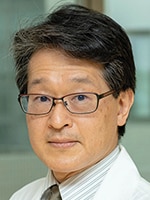Steve Ziolkowski
December 2022—Atsushi Ohtsu, MD, PhD, director of Japan’s prestigious National Cancer Center Hospital East, reached a groundbreaking decision with his management team in February 2020: They decided to pursue CAP accreditation. While the CAP has accredited more than 40 laboratories in Japan, this was to be a first for a Japanese hospital. And it was: In September 2022, the CAP advised the cancer center (NCCE) of its success in achieving accreditation and congratulated the team for the excellence of its laboratory services.

Dr. Ohtsu
“By maintaining CAP accreditation in the future,” Dr. Ohtsu said, “the National Cancer Center Hospital East will provide the highest level of quality patient outcomes. And as a more internationally oriented hospital, we will work to further improve treatment and promote clinical research and development based on our patient-first policy.”
After deciding in 2020 to seek accreditation, Dr. Ohtsu’s next step was to contact two experts connected to the CAP: former (and now the late) CAP president Gene Herbek, MD, and Mark Colby, president of CGI, the company that has provided CAP support in Japan for more than 30 years. Two days of meetings were arranged, highlighted by education sessions led by Dr. Herbek with a focus on the needs of NCCE laboratory director Genichiro Ishii, MD, PhD, and his department heads.
From the start, Dr. Ohtsu had a series of questions related to NCCE’s goals and objectives. He said he wanted his laboratory and pathology services to be on par with those of the best hospitals in the world and asked how CAP accreditation would help achieve this. He also wanted to know how CAP accreditation would help drive best-in-class patient outcomes. Dr. Ohtsu noted that NCCE already had achieved ISO 15189 certification and wondered why international partners favored the CAP as the global standard. He asked, too, about the accreditation process itself and what support was available to help achieve accreditation.
Dr. Herbek addressed Dr. Ohtsu’s questions. “First, Dr. Herbek outlined the detailed technical CAP checklists and annual checklist updates as well as the collaborative peer-to-peer nature of the inspection process,” Colby recalls. Dr. Herbek also highlighted how each inspector needed certification in the technical specialty they are tasked with inspecting. “Besides these technical aspects, Dr. Herbek also discussed the importance of quality and meaningful communication among the lab and clinical staff, something absolutely essential, often challenging, and emboldened by the CAP requirements,” Colby says. Other topics included the need for labs to take responsibility for the quality of point-of-care testing and blood gas procedures even if performed by the nursing staff, the vital nature of proficiency testing for all analytes, and the challenges associated with next-generation sequencing and laboratory-developed testing processes.
Cultural differences exist even in scientific labs, and many of the concepts Dr. Herbek introduced are novel to Japanese laboratories and their staff, which Dr. Herbek understood, Colby says. When answering Dr. Ohtsu’s question about why international partners prefer CAP standards over ISO, for example, Dr. Herbek surmised that CAP standards are interpreted the same way worldwide while ISO’s standards tend to be perceived differently from country to country, leading to a greater number of variables among institutions—a problem for researchers and government regulators alike.

Dr. Ishii
Dr. Ohtsu and Dr. Ishii were concerned about the more than 2,000 requirements that had to be met for CAP accreditation. One of the NCCE senior staff asked where to even start. Colby explained that CGI has decades of expertise in helping labs that seek CAP and even ISO accreditation. “In the past we used old-fashioned consulting practices, spreadsheets, and now-antiquated project management systems as well as education sessions and such,” Colby told them. “This process was mainly manual, not to mention extremely complex, time-consuming, and expensive, and it required tremendous management bandwidth from the labs as well as from our consultants and coaches.” However, after a nearly two-decade development period, Colby explained, “most of those old, unwieldy management and education processes had been automated into an online software product called LEAP.”
LEAP (Laboratory Education and Accreditation Program) is comprehensive, he said. It involves the entire laboratory staff, and it sets up and manages all projects, educates the staff, and is loaded with a full range of materials ready for customization to meet any hospital’s or lab’s needs. LEAP is also ongoing so it continually monitors the lab’s progress in maintaining its accreditation processes. “LEAP has been designed for any and all labs building systems from scratch, including NCCE’s,” Colby explained.
 CAP TODAY Pathology/Laboratory Medicine/Laboratory Management
CAP TODAY Pathology/Laboratory Medicine/Laboratory Management
